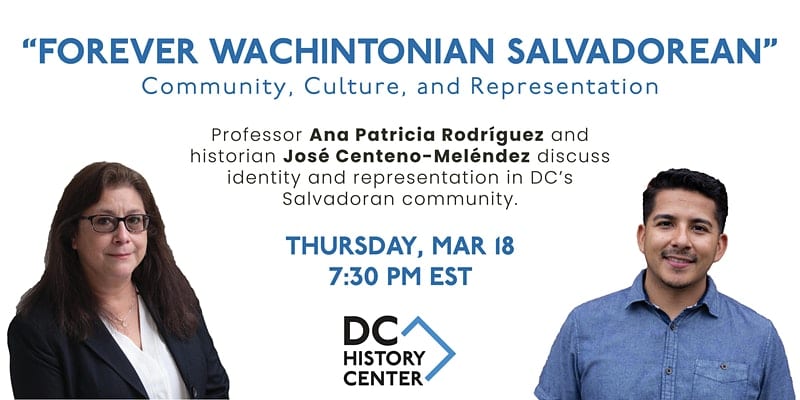Note: All submitted events must be approved before they appear in the calendar.

- This event has passed.
Forever Wachintonian Salvadorean: Community, Culture & Representation

About this Event
Salvadoran Americans are the fourth largest Latino group in the US, but in DC, they are the largest segment–which is not broadly known. Though Salvadorans have shaped the city and its neighborhoods over the past 40 years, they have not historically been well represented in city government or other public spaces and forums.
Where does the Salvadoran community fit within DC’s larger Latino community, as well as the city as a whole? What does it mean to be a Salvadoran Washingtonian? What public spaces and forums does this community occupy? And how will their stories be preserved?
Professor Ana Patricia Rodríguez and oral historian José Centeno-Meléndez will discuss how DC’s Salvadoran immigrant community maintains its cultural identity in DC. They will be joined by special guest Abel Nuñez, executive director of CARECEN, for a conversation about issues of Salvadoran political representation and the impact of both local and federal politics on the community.
“Forever Wachintonian Salvadorean”: Community, Culture, and Representation is the latest installment in the DC History Center’s Context for Today series of online conversations with thoughtful and thought-provoking historians.
Participation instructions and the Zoom link will be sent to registrants prior to the event.
ABOUT OUR SPEAKERS
Ana Patricia Rodríguez is Associate Professor in the Department of Spanish and Portuguese and U.S. Latina/o Studies minor at the University of Maryland, College Park, where she teaches classes on Latin American, Central American, and U.S. Latina/o literatures and cultures. She has published widely on Central American transnational cultural production. She is the author of Dividing the Isthmus: Central American Transnational Histories, Literatures, and Cultures and co-editor of De la hamaca al trono y al más allá: Lecturas críticas de la obra de Manlio Argueta. She contributed “Becoming ‘Wachintonians’: Salvadorans in the Washington, D.C., Metropolitan Area” to the fall 2016 issue of Washington History. Professor Rodriguez is completing a book manuscript on (post)memory in the Central American diaspora. She dedicates a great part of her time to working on community-based projects with the local immigrant communities in the DC metropolitan area.
José Centeno-Meléndez is a native of Prince George’s County, Maryland, with familial ties to 1970s Adams Morgan. As a historian, he collaborates with diverse communities to advocate for the recognition of Latina/o/x-based histories in the D.C. area. José is a PhD Candidate in American studies at the University of Texas at Austin, and his dissertation documents the growth of Salvadoran communities in DC from the 1960s to 1990s through a food studies, urban history, and oral history lens. He is a graduate of the Smithsonian Latino Center’s Latino Museum Studies Program and works as an oral historian at the National Museum of American History.
Abel Nuñez has served as the Executive Director of CARECEN since March 2013. Mr. Núñez migrated from El Salvador to the United States with his family in 1979 and grew up in the District of Columbia. He has a Bachelor’s of Business Administration from Hofstra University. Mr. Núñez’ career and volunteerism reflect his lifelong pursuit of justice and empowerment for immigrants in the U.S. Nationally, Mr. Núñez has been one of the founding members of the Residency Now campaign (now known as the National TPS Alliance) which was launched in January 2012. He also co-founded the DC-MD-VA Coalition in Support of Children Fleeing Violence which responded to the incoming wave of unaccompanied children in the summer of 2013. He has served on many local boards and has received numerous awards in recognition of his service.
The DC History Center is a 501(c)3 non-profit educational organization that deepens understanding of our city’s past to connect, empower, and inspire. As the only community-based nonprofit focused on the District’s history, our vision is to reach into all eight Wards to preserve and elevate the stories of Washington’s diverse people, neighborhoods, and institutions. Visit us at www.dchistory.org and follow us on Facebook, Twitter, and Instagram @dchistory.
The DC History Center gratefully recognizes support from Events DC and the D.C. Commission on the Arts and Humanities.
Suggested registration: $20 (supports current and future program costs). If you are not in a position to pay that amount, please pay what you are able.
